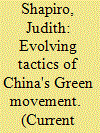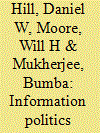|
|
|
Sort Order |
|
|
|
Items / Page
|
|
|
|
|
|
|
| Srl | Item |
| 1 |
ID:
141948


|
|
|
|
|
| Summary/Abstract |
TODAY, the old conflict between political and economic structures of the West and the East is unfolding against the background of another global crisis. The countries and business structures of the "golden billion" have not relieved their economic pressure on the developing countries. The globalizers do not hesitate to pile political responsibility for regional tensions on the powers that the First World finds unpalatable. Something similar is going on in the information field.
|
|
|
|
|
|
|
|
|
|
|
|
|
|
|
|
| 2 |
ID:
113939


|
|
|
|
|
| Publication |
2012.
|
| Summary/Abstract |
Transnational advocacy organizations are influential actors in the international politics of human rights. While political scientists have described several methods these groups use - particularly a set of strategies termed 'information politics' - scholars have yet to consider the effects of these tactics beyond their immediate impact on public awareness, policy agendas or the behavior of state actors. This article investigates the information politics surrounding sexual violence during Liberia's civil war. We show that two frequently-cited 'facts' about rape in Liberia are inaccurate, and consider how this conventional wisdom gained acceptance. Drawing on the Liberian case and findings from sociology and economics, we develop a theoretical framework that treats inaccurate claims as an effect of 'dueling incentives' - the conflict between advocacy organizations' needs for short-term drama and long-term credibility. From this theoretical framework, we generate hypotheses regarding the effects of information politics on (1) short-term changes in funding for human rights advocacy organizations, (2) short-term changes in human rights outcomes, (3) the institutional health of humanitarian and human rights organizations, and (4) long-run outcomes for the ostensible beneficiaries of such organizations. We conclude by outlining a research agenda in this area, emphasizing the importance of empirical research on information politics in the human rights realm, and particularly its effects on the lives of aid recipients.
|
|
|
|
|
|
|
|
|
|
|
|
|
|
|
|
| 3 |
ID:
123359


|
|
|
|
|
| Publication |
2013.
|
| Summary/Abstract |
The activists' strategies . . . reflect both the importance of new social media and the shifting constraints under which civil society must operate in an authoritarian state.
|
|
|
|
|
|
|
|
|
|
|
|
|
|
|
|
| 4 |
ID:
120867


|
|
|
|
|
| Publication |
2013.
|
| Summary/Abstract |
''Information politics'' INGOs such as Amnesty International have incentives to maintain their credibility by carefully vetting information about rights abuses committed by governments. But they are also strategic actors that may inflate allegations of abuse to fulfill organizational imperatives. This raises an intriguing question: When are INGOs more likely to exaggerate their allegations? In answer to this question, we argue that news media reporting pressures INGOs to comment for organizational reasons, even if the information available to them is poor. On the other hand, higher numbers of domestic human rights NGOs increase the quality of available information, and INGOs will find more credible information provided about states as the winning coalition to the selectorate rises. Yet, an incentive to exaggerate allegations under certain conditions does not imply that INGOs will always do so. Indeed, there exists significant observed variation in INGO reports about government abuse. To test our hypotheses, we employ a zero-inflated ordered probit model with correlated errors that permits us to model an unobservable probability (the probability that the INGO exaggerates its allegations) and correct for potential bias. Results provide support for our hypotheses, and suggest that Amnesty International adheres to its credibility criterion, rarely succumbing to incentives to exaggerate abuse.
|
|
|
|
|
|
|
|
|
|
|
|
|
|
|
|
| 5 |
ID:
168196


|
|
|
|
|
| Summary/Abstract |
In recent decades, IGOs, NGOs, private firms and even states have begun to regularly package and distribute information on the relative performance of states. From the World Bank's Ease of Doing Business Index to the Financial Action Task Force blacklist, global performance indicators (GPIs) are increasingly deployed to influence governance globally. We argue that GPIs derive influence from their ability to frame issues, extend the authority of the creator, and — most importantly — to invoke recurrent comparison that stimulates governments' concerns for their own and their country's reputation. Their public and ongoing ratings and rankings of states are particularly adept at capturing attention not only at elite policy levels but also among other domestic and transnational actors. GPIs thus raise new questions for research on politics and governance globally. What are the social and political effects of this form of information on discourse, policies and behavior? What types of actors can effectively wield GPIs and on what types of issues? In this symposium introduction, we define GPIs, describe their rise, and theorize and discuss these questions in light of the findings of the symposium contributions.
|
|
|
|
|
|
|
|
|
|
|
|
|
|
|
|
|
|
|
|
|